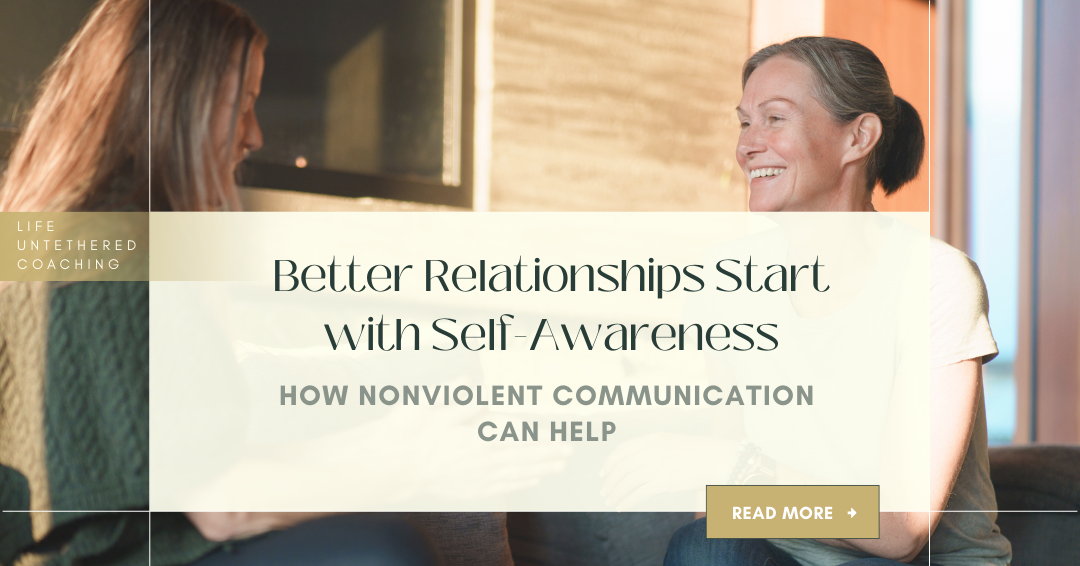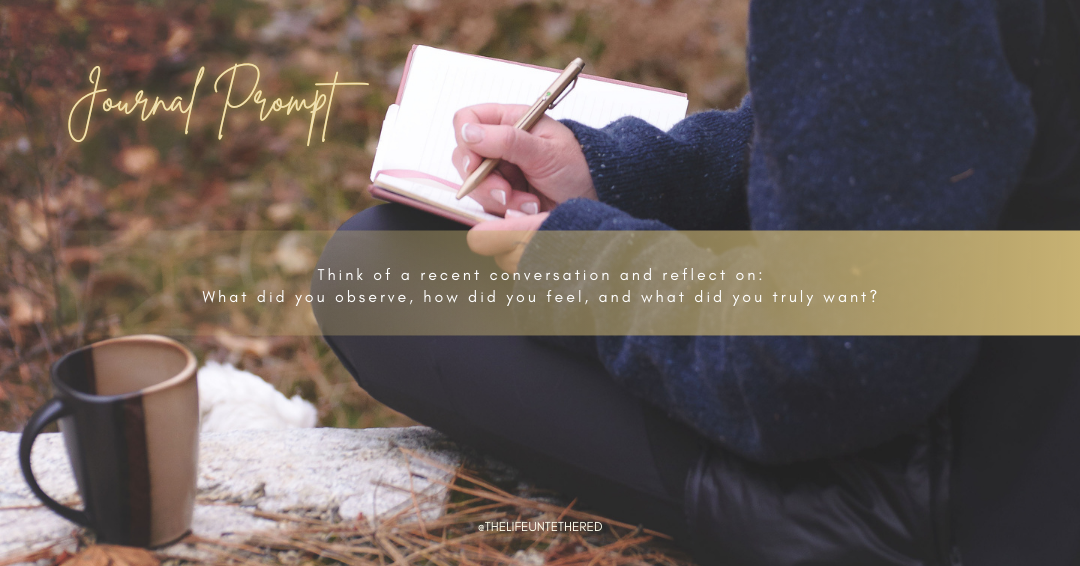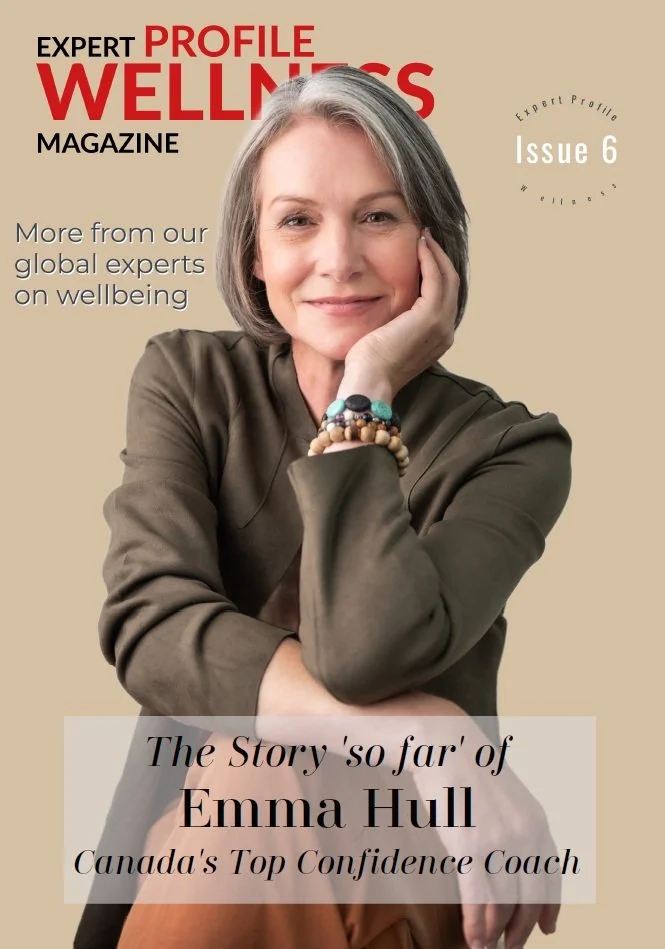Better Relationships Start with Self-Awareness: How Nonviolent Communication Can Help
Why Better Relationships Start with Self-Awareness
Improving your relationship with yourself is one of the most powerful ways to improve your relationships with others. When you are grounded, compassionate, and truly understand your own inner world, you show up differently in every interaction. You are calmer, clearer, and more connected, which invites the same energy back from the people around you.
One way to strengthen this relationship with yourself is through Nonviolent Communication (NVC), a tool developed by Marshall Rosenberg in the 1960s and 70s. Rooted in empathy and compassion, NVC is based on the idea that we all share universal human needs such as safety, appreciation, and trust. Traditionally, it is used to improve communication between people, but it can also be a powerful practice for self-awareness and self-connection.
The Nonviolent Communication Framework for Self-Awareness
The framework has four steps: observation, feelings, desires, and requests. When you walk through these steps, you begin to uncover what is really going on inside of you, giving you clarity and insight that improves not only your relationship with yourself but also with others.
Step One: Observation for Clearer Self-Awareness
Observation is about clearly stating the situation without judgement, blame, or projection. It is noticing what actually happened, not the story you have added on top. Sometimes that means taking a step back, even giving yourself a 30-minute break, so you can return with more clarity. I like to think of it as shifting into a third-person perspective. After all, there are always three sides to every story: your side, my side, and the truth. When you practise observing in this way, you learn to see things more factually and less through the lens of reaction.
Step Two: Feelings and Emotional Self-Awareness
Feelings are about pausing and noticing what is really going on for you in response to the situation. This means checking in somatically, how does it feel in your body? Maybe your heart is racing, your palms are sweating, your chest feels tight, or you notice yourself shaking. Alongside these physical cues, there are the emotions: perhaps you feel angry, misunderstood, or dismissed. Too often, we skip this step and rush past what is actually happening inside us. But taking the time to analyse and articulate your feelings builds emotional awareness. And like any skill, it gets easier the more you practise.
Step Three: Desires and What Truly Drives You
Traditionally this step is called “needs,” but I prefer to use the word desire. It shifts us away from telling others “I need you to…” and instead invites us into ownership of what is alive within us. For example, “I desire to feel heard” is gentler, more empowering, and truer to the spirit of NVC than “I need you to hear me.” When you can identify the desire underneath your feelings, you uncover the root of what is really going on.
Step Four: Requests That Support Better Relationships
Requests are the concrete, actionable steps you can take to help meet your desire. It is important to remember that just because you make a request, it does not guarantee the other person will meet it. Instead, think of it as a starting point, a negotiation that opens the door to deeper understanding and possible agreement. And when you apply this inwardly, requests become small, doable steps you can take to care for yourself and honour what you have discovered through observation, feelings, and desires.
An Everyday Example of Nonviolent Communication: When Someone Is Late
Let’s use the example of someone showing up late.
Your observation might be that this is the third time this person has been late, that you both mutually agreed on the time and place, and that they are now more than 15 minutes late. Those are the facts, without stories or judgement added.
Your feelings might be that you notice yourself getting a little flushed, your chest feels tight, maybe your face is red. You might find yourself drumming your fingers, tapping your toes, or compulsively checking your watch. The longer you wait, the angrier you feel. You might also notice that you start spiralling, making up stories about them as a person and about what this means for you, such as “I must not be important to them.”
Your desire in this case is for them to show up on time. Or, if they cannot, to let you know they are running late so that you can adjust your schedule accordingly. Maybe you could run a few errands before meeting them rather than sitting and feeling like your time is being wasted.
Your request could be as simple as: “I was wondering if next time we meet, it would be great if you could be on time. And if something comes up, could you please let me know?”
Even if you never end up having this conversation with the other person, you have still learned something valuable about yourself. You have discovered that punctuality matters to you. That feeling respected is important to you. That efficient use of your time is important to you. This kind of awareness gives you clarity, and it can also help you set stronger boundaries in the future.
Try It Yourself: Using Nonviolent Communication for Self-Awareness
I invite you to think about a recent situation that triggered a strong reaction in you. Maybe it was something at work, at home, or with a friend. Walk yourself through the NVC framework: What were the facts of what happened? How did you feel, both in your body and in your emotions? What desire was underneath those feelings? And what request could you make of yourself or someone else to honour that desire?
Stronger Self-Awareness Means Better Relationships
The more you practise this, the more self-awareness you build. You begin to see what truly drives you, what motivates you, what rewards you, and where your boundaries are. And when you strengthen your relationship with yourself in this way, you show up more grounded, more compassionate, and more connected in all of your other relationships too.
Emma Hull is Canada’s Top Confidence Coach, an internationally recognised life coach, speaker and author of Your Goddess Era: A Step-by-Step Guide to Reinvention.
She helps women at a crossroads to move forward with confidence.
Emma is the founder of Life Untethered Coaching based in Kamloops BC and serving clients worldwide. Book your free strategy session to begin your transformation.



